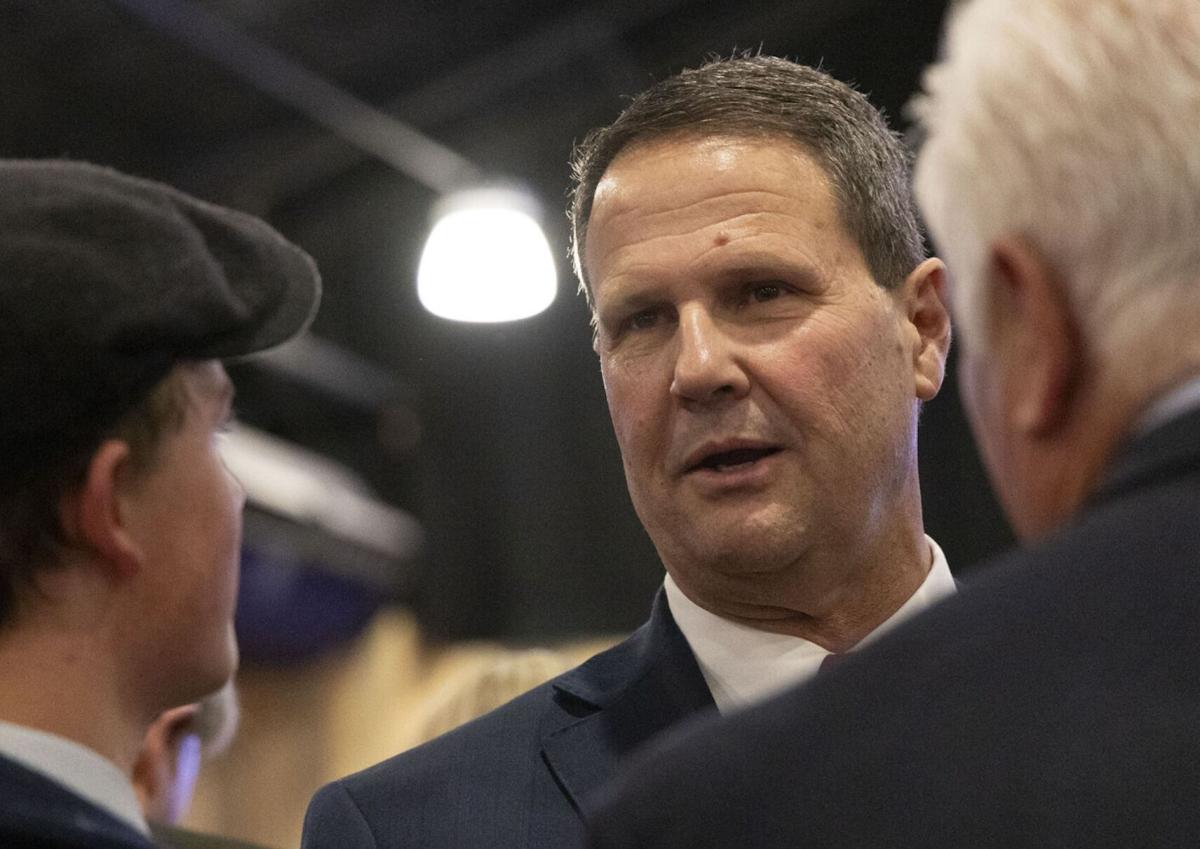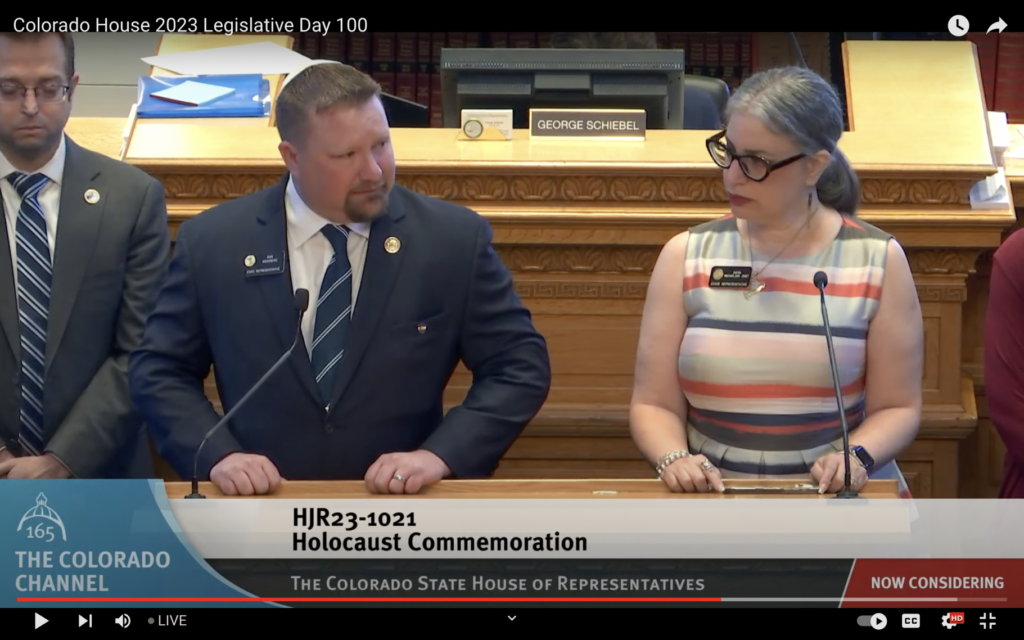Q&A with US Rep-elect Jeff Crank | Colorado Republican ‘optimistic’ about enacting Trump’s agenda
Colorado Springs Republican Jeff Crank finally won election to Congress in 2024, nearly two decades after his first run in the El Paso County-based 5th Congressional District seat, which has been represented since 2007 by Republican U.S. Rep. Doug Lamborn.
Crank ran for the seat twice before, in 2006 and 2008, after serving as a top aide to the seat’s prior occupant, former U.S. Rep. Joel Hefley. Although Crank lost both times to Lamborn in Republican primaries, he won Lamborn’s endorsement this year in a primary against state GOP Chairman Dave Williams.
A former conservative talk radio host, podcaster and longtime executive with the Koch network’s Americans for Prosperity political organization, Crank easily won election in November over Democratic nominee River Gassen in a district that has only sent Republicans to Washington since its creation in the early 1970s.
Colorado Politics spoke with Crank on New Year’s Eve, three days before the newly elected Congress was scheduled to be sworn in on Friday, Jan. 3, though the narrow Republican majority in the House of Representatives must first elect a speaker before members can take office. Crank waved away concerns that House Speaker Mike Johnson could lack sufficient votes to win the speaker’s race, noting that he has joined former President Donald Trump in supporting Johnson.
Our interview with Crank has been lightly edited for length and clarity.
Jeff Crank: Happy New Year to you!
Colorado Politics: Happy New Year!
Crank: It is so far; so far, it’s not been too bad, but it isn’t the new year yet, right?
CP: We can check in again tomorrow and see what things look like.
Crank: Let’s check in on Saturday and see.
CP: You’ll be sworn in by then, right?
Crank: I hope so. I think so.
CP: That does depend on if you elect a speaker.
Crank: My understanding is, we all vote to elect a speaker, but we can’t actually be sworn in until there is a speaker. So, yeah, I suppose there’s a slight possibility that they could delay all of that. I don’t think that will happen. I think we’ll have a speaker on Friday.
CP: That’s what happened two years ago, the swearing-in was delayed for the new members from Colorado until they went through all that. But you’re not anticipating a long process electing a speaker this year?
Crank: I don’t think so. I would hope not. The Republican conference voted unanimously to elect Mike Johnson, and I don’t see that that’s changed. I know President Trump came out yesterday and said he fully supports Mike Johnson.
You know, to me, for the people who got elected saying that they were going to go to Washington and get President Trump’s agenda passed, that’s the only logical choice, is to vote for Speaker Mike Johnson. Otherwise, we’re simply fighting over personalities and things like that, and that’s only delaying what we were sent to Washington to do, and that’s to lead.
CP: You worked for Congressman Joel Hefley more than 20 years ago in Congress. How has Congress changed since then?
Crank: I think it’s changed a lot, probably in many ways not for the better. I think it’s a less cordial place in a lot of ways than it was back then. I’ve often talked about many stories of collegiality between my boss, Joel Hefley, and members of the Colorado delegation who were Democrats, or Democrats in general. You saw it all the time, but to me, that’s a personality thing. And that’s one of the things that I think I do bring — I try to be the kind of person that reaches across the aisle. We may not agree on principle on a lot of things, and that’s OK, but I’m not someone who’s going to call someone I disagree with bad names or whatever. I’m there to be productive, and if they don’t agree with me, that’s OK, we’ll probably fight another day on the same side of an issue somewhere down the road.
So I think it’s changed quite a bit in that regard, and part of that may be the thinner majority, right? I mean, when you have a razor-thin majority and you need every vote, I think that puts everybody on edge, and it makes it a little bit more partisan, but we’re called by the American people to lead and to do what’s right, and that’s where I hope we start off.
CP: We’re transitioning from the 118th Congress, one of the least productive congresses in decades. Are you hopeful that you’ll be able to get legislation you’ve sponsored or be part of legislation that will pass this year? Are we going to see a more productive 119th Congress?
Crank: I think we will, and I’m very hopeful about that. First of all, we have unified government, right? We didn’t have that in the 118th Congress, and so I think that that will make a big difference.
You know, Congress is broken, there’s no doubt about it. And it’s been broken for quite a while. When we don’t have regular order and we’re not getting budget resolutions done and things like that, the whole system breaks down, and we’ve got to fix that. I mean that the institution itself doesn’t work well when it doesn’t work by the rules. And I would say that it’s the same way that society is — that’s why I’m a rule-of-law, law-and-order type person.
When you just ignore the rules, all of a sudden the whole system breaks down. I think you see that in society, for sure, but we’re also seeing that in Congress when that breaks down, and there isn’t a set of rules that you go by, that leads to chaos and and unproductivity. But I do believe that we’re going to come in, and I am hopeful that, one, we elect speaker Johnson in the House, and we move forward united to get President Trump’s agenda done. That’ll include, obviously, efforts on budget reconciliation, but also, he’ll do some things through executive order, and then we’ve got a lot of work to do legislatively to get back to regular order, pass appropriations bills, all that sort of thing.
CP: Speaking of appropriation bills, would you have voted for the continuing resolution that Congress passed just before Christmas?
Crank: Well, it depends on the version. The one that finally passed, yes, I would have voted for that one. I would not have voted for the first one that was proposed.
CP: There are a couple of things the Trump administration could do, starting on Day One, that could have big impacts on Colorado. President-elect Trump has said he plans to start the largest deportation in the country’s history in Colorado, in Aurora, possibly using the military. What do you think will happen, and what will you do?
Crank: Obviously, I don’t want to presuppose what the specifics of what the president is going to do. He’s made it very clear, he ran on the issue, and from what I saw from polling data, deportation of people who came here illegally, the citizens of the United States voted for that. That was one of President Trump’s main talking points. And so we’ve got to do what the president said he was going to do. So I am for deporting people, starting with the half a million that we know that are here who are criminals and felons and are bad people. I mean, that shouldn’t even be controversial. We ought to get those folks out of here, and we ought to do it immediately. And I’m more than happy to have it start in Colorado.
Colorado has a crime problem. That’s not going to solve it all — there’s many other pieces to this, including some of the things that our legislature has done over the last many years, but that’s certainly an element of it. We don’t want people in the United States that have committed crimes, and if they’re here illegally, they shouldn’t be our problem. They should be sent back to the country that they illegally came here from, and it can be their problem.
CP: Will you vote to increase the immigration court system to process all those folks? There’s a huge backlog there.
Crank: We have to see what legislative proposal there is, so I’m not going to commit to anything until I see it, but, look, the system is broken. I think we need, obviously, more Border Patrol agents. We need more border wall. We need all that stuff. And we do need to fix the system, and that does include more personnel, whether it’s Border Patrol agents or legal folks to adjudicate these things. I won’t say I’m going to vote for any specific proposal until I see it, but the American people sent us here to fix this problem, and if that’s part of the solution, then I’m going to do that.
CP: What are you hearing about Space Command? What’s the delegation doing to make sure that the headquarters stay here, and what do you expect will happen?
Crank: We’re doing a lot. I’ve met with or talked with everyone in the delegation. I met with both of our U.S. senators, had great meetings with them. We are working as a community. We’re meeting as a delegation and our staffs are meeting about this, and we’ve got a pretty robust plan.
No. 1, we don’t know if the decision has been made or not by the president. There were some rumors about that; we’re trying to figure that out. We do plan to present to the president the reasons why we believe it makes sense to keep Space Command in Colorado, and we’re going to fight vigorously to do that. We’re going to do it in a very bipartisan way. I’ve been very pleased with the support I’ve gotten from, really, everyone in the delegation, and excited to get there and be able to do it.
That’s been my biggest frustration is, because I don’t hold office right now, there’s nothing I can do. I mean, I can prepare to do things, but I don’t have any sort of authority to do it. So I’m very anxious for Friday to be here and to get started, so that we can work on that.
CP: What are your thoughts heading into office? Are you optimistic?
Crank: Yeah, I am optimistic. I really am. I think there’s so much work to do. I think we’ve got to stay true to what we said we were going to do. There’s going to be difficult votes that we have to cast to do that, but I am optimistic about the future of America.
And I think as we get closer, not only to Friday, but then to (Jan.) 20th and the new president getting sworn in, I think there’s just going to be a growing sense of optimism — about our economy, about our our standing on the world stage, all sorts of things, so I’m pretty optimistic about it.



